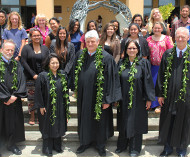Article from: www.thenewspaper.com/news/49/4922.asp
3/24/2016
Hawaii Supreme Court Tosses Another Laser Speed Ticket
Lidar speed reading found to be of dubious accuracy in Hawaii Supreme Court ruling.
 Police agencies have continue to have a tough time handing out speeding tickets in Hawaii. Over six years ago, the state's highest court threw out citations based on the LTI 20-20 Ultralyte laser speed gun because the accuracy of its speed estimates was unsubstantiated (view ruling). Last week, the Hawaii Supreme Court unanimously overturned the speeding ticket issued to motorist Colin Gardner after finding that nothing had changed.
Police agencies have continue to have a tough time handing out speeding tickets in Hawaii. Over six years ago, the state's highest court threw out citations based on the LTI 20-20 Ultralyte laser speed gun because the accuracy of its speed estimates was unsubstantiated (view ruling). Last week, the Hawaii Supreme Court unanimously overturned the speeding ticket issued to motorist Colin Gardner after finding that nothing had changed.
On January 19, 2013, Maui Police Officer Carl Eguia was running a speed trap using an LTI 20-20 TruSpeed lidar gun that he used to claim Gardner was traveling at 76 MPH in a 45 zone, an offense that carries a potential maximum sentence of $1125 in fines, five days in jail and a thirty-day license suspension. Gardner testified that he had his cruise control set at 45 MPH and that other cars were passing him to the left. His vehicle also had no front license plate, which officers often use as a target for the laser gun.
At trial, Officer Eguia testified that he pressed the "self test" button on the laser gun, and the gun reported that it was accurate. Bob Long, an individual loosely associated with LTI, trained Officer Eguia in September 2012 on how to teach others to use the device. That was all it took to satisfy Wailuku Division Circuit Court Judge Richard A. Priest Jr, who declared Gardner guilty, imposing $625 in fines and assessments, a thirty-day license suspension and mandatory attendance at a driver retraining course.
A three-judge panel of the Intermediate Court of Appeals last year sided with Judge Priest, rejecting the idea that prosecutors had an obligation to prove the speed gun had been inspected and serviced in accordance with the manufacturer's recommendations. Through his public defender, Gardner appealed to the state's highest court, insisting that Officer Eguia merely repeated things that he read in the laser gun's manual. He argued such statements were inadmissible hearsay. The high court justices agreed that the state failed to meet its burden of proof regarding the "first requirement" that a laser operator be trained according to the manufacturer's recommendations.
"Specifically, there is no evidence that Mr. Long taught Officer Eguia how to execute the manufacturer's required tests to verify the accuracy of the laser gun," the high court ruled. "Additionally, Officer Eguia did not testify that he executed those tests pursuant to what he learned from Mr. Long. Without such a showing, the prosecution failed to demonstrate that the instructor training Officer Eguia received from Mr. Long satisfies the first requirement."
Because the training was not properly established, the court ruled that the foundation for the laser speed reading was inadequate, and the lower court rulings were overturned.
A copy of the decision is available in a 270k PDF file at the source link below.
Source: Hawaii v. Gardner (Hawaii Supreme Court, 3/15/2016)
Permanent Link for this item
Return to Front Page
 Police agencies have continue to have a tough time handing out speeding tickets in Hawaii. Over six years ago, the state's highest court threw out citations based on the LTI 20-20 Ultralyte laser speed gun because the accuracy of its speed estimates was unsubstantiated (view ruling). Last week, the Hawaii Supreme Court unanimously overturned the speeding ticket issued to motorist Colin Gardner after finding that nothing had changed.
Police agencies have continue to have a tough time handing out speeding tickets in Hawaii. Over six years ago, the state's highest court threw out citations based on the LTI 20-20 Ultralyte laser speed gun because the accuracy of its speed estimates was unsubstantiated (view ruling). Last week, the Hawaii Supreme Court unanimously overturned the speeding ticket issued to motorist Colin Gardner after finding that nothing had changed.